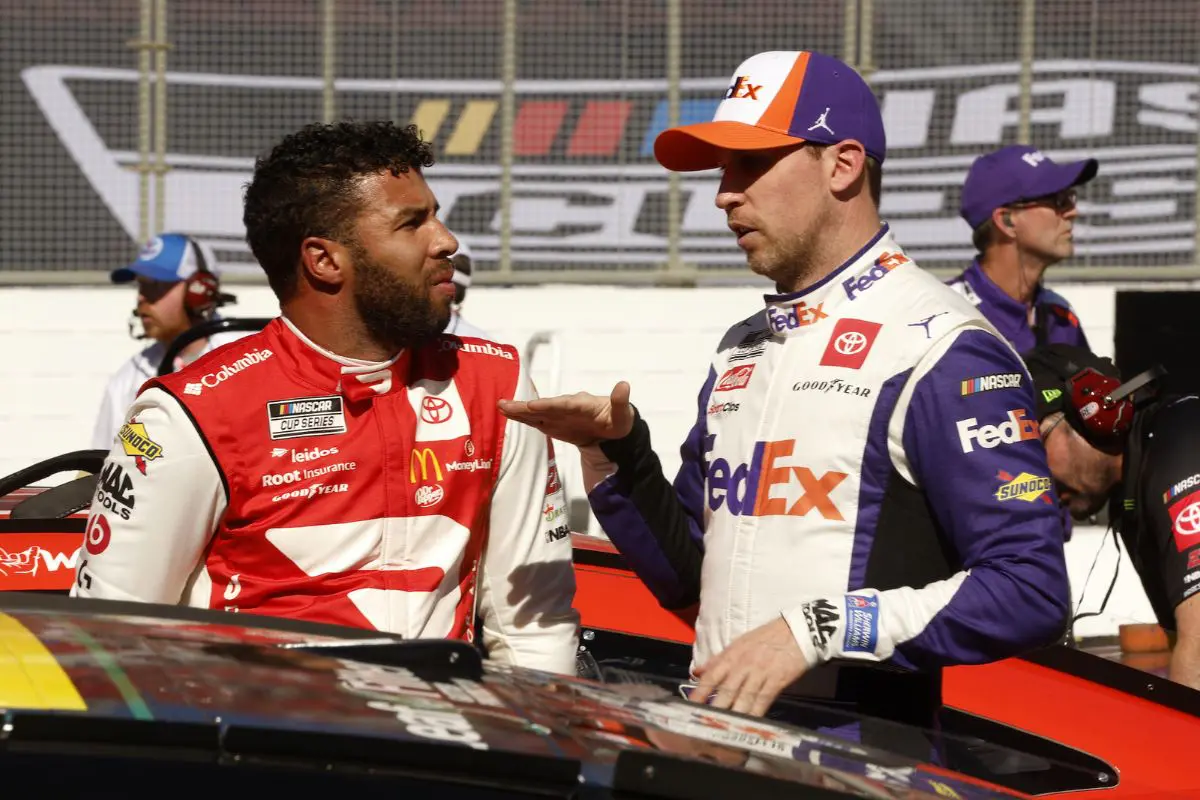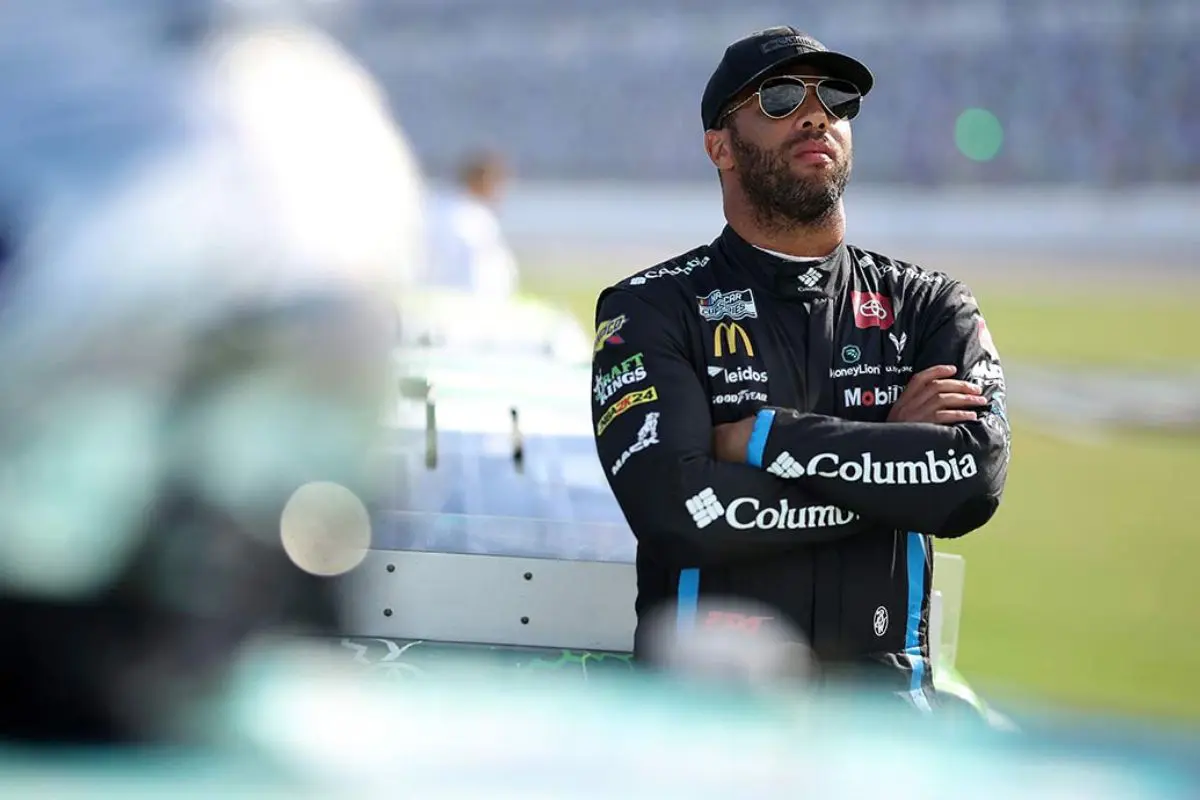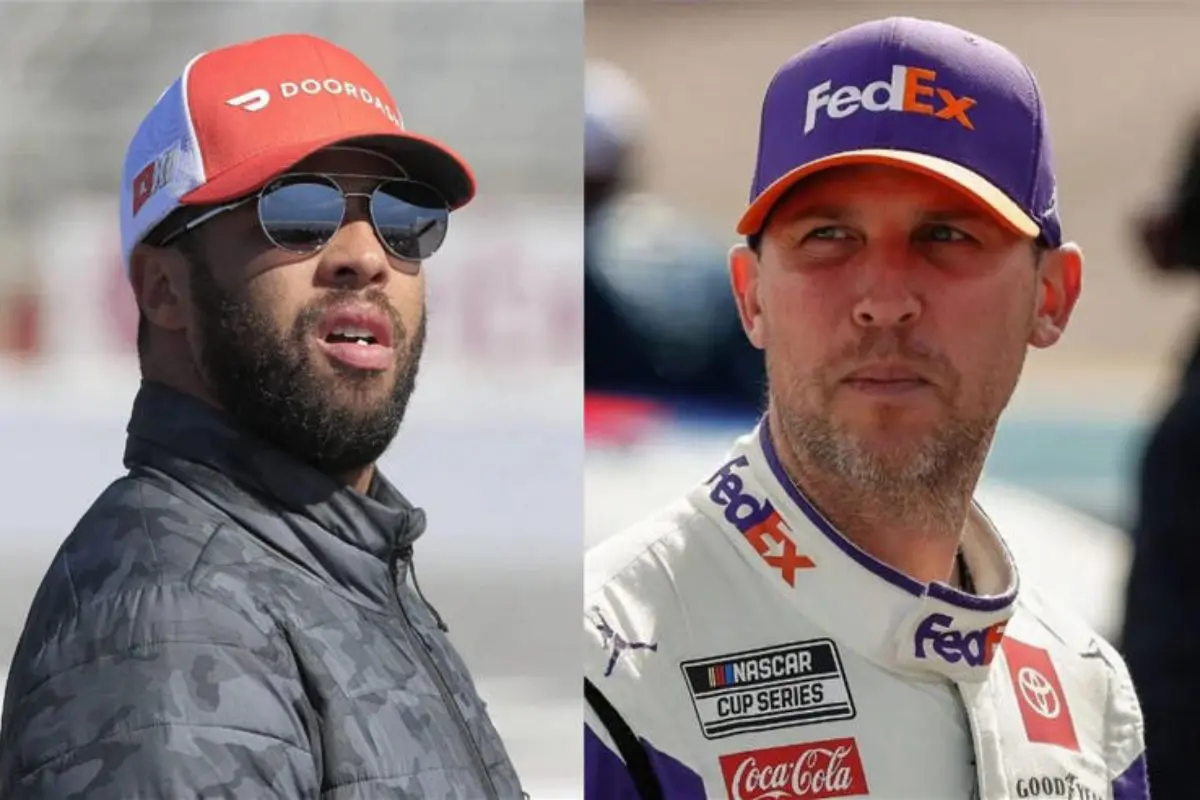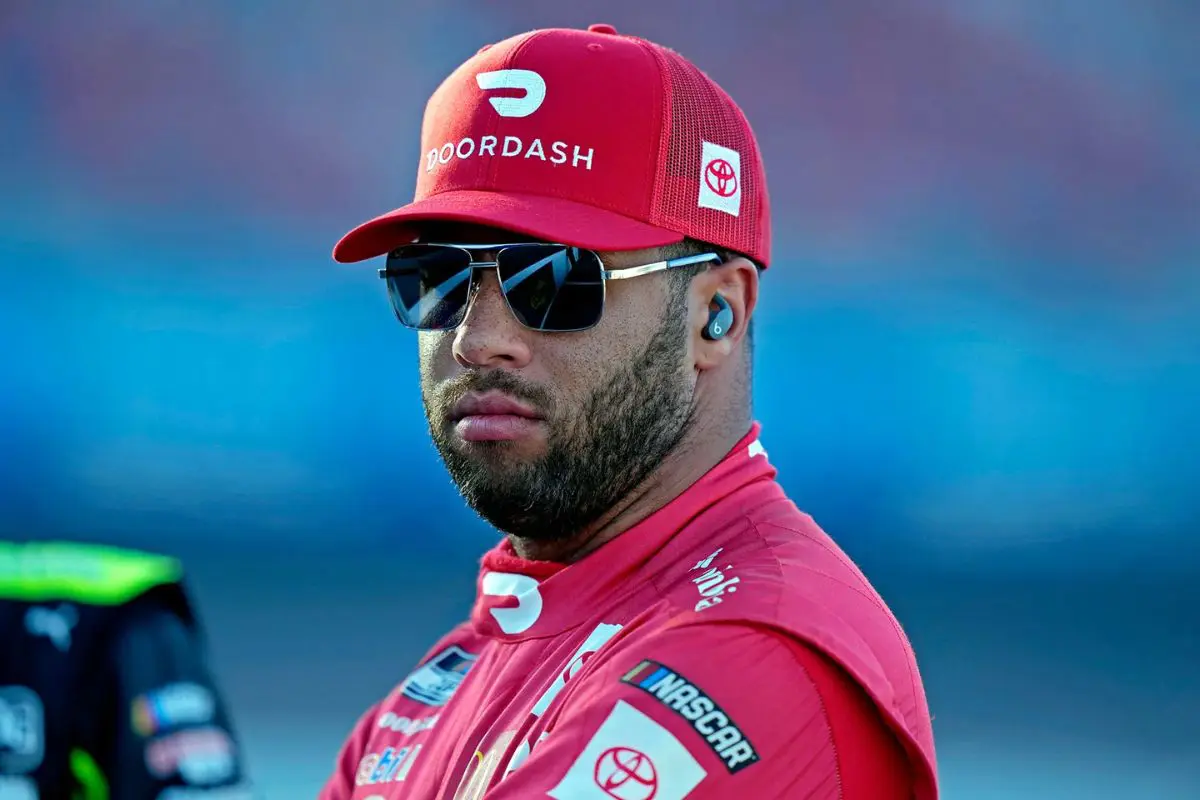Denny Hamlin Slams Wallace’s Darlington Win Narrative: Denny Hamlin‘s critique of the narrative surrounding Bubba Wallace‘s Darlington victory raises crucial questions about the broader implications of race strategy and performance consistency in NASCAR. By asserting that Wallace’s win was not truly within reach, Hamlin challenges the prevailing notion that a singular victory can define a driver’s season. This perspective invites a deeper examination of the factors influencing race outcomes and the competitive landscape that drivers navigate. What does this mean for Wallace’s future in the sport, and how might it reshape the conversation around success?
Key Highlights
- Denny Hamlin criticized the narrative surrounding Bubba Wallace’s Darlington win, stating it was not realistically attainable amid strong competition.
- Hamlin emphasized that Wallace’s individual race success did not reflect consistent season performance necessary for playoff qualification.
- He dismissed the notion that an early pit stop significantly impacted Wallace’s race outcome, highlighting overall performance as more critical.
- Hamlin pointed out that Wallace’s team struggled with pace and pit strategy, losing valuable track position throughout the race.
- The competitive nature of the race environment played a significant role in Wallace’s inability to secure a win at Darlington.
Analysis of Bubba Wallace’s Strategy at Darlington
Bubba Wallace’s strategy during the Cook Out Southern 500 at Darlington Raceway can be dissected through several crucial decisions that ultimately influenced his performance. Starting from the pole position after a strong qualifying effort, Wallace had a prime opportunity to utilize this advantage. However, the execution of race strategy fell short. The No. 23 Toyota team faced challenges in maintaining ideal tire management, which may have compromised his pace throughout the race.
One key decision was the timing of pit stops. Early in the race, Wallace’s team opted for a conservative approach, which limited their ability to take advantage of favorable track position. As the race unfolded, competitors who adjusted their strategies to seize upon changing track conditions surged ahead, leaving Wallace stranded in a mid-pack position. This highlights a crucial miscalculation in recognizing the dynamics of the race and the need for more aggressive adjustments.
Moreover, Wallace’s inability to adapt to the evolving race environment was evident. While his initial speed was promising, the subsequent laps revealed a struggle to find consistent momentum. This lack of adaptability in race strategy ultimately forced him to settle for a disappointing 16th place finish, denying him a coveted playoff spot.
In retrospect, a more aggressive tactical approach, particularly in managing tire wear and adjusting pit strategies based on competitor actions, could have greatly altered the outcome for Wallace. Analyzing these factors not only sheds light on this race but also provides valuable insights for future performances.
Denny Hamlin’s Assessment of Wallace’s Chances
Denny Hamlin’s frank assessment of Bubba Wallace’s chances in the postseason highlights the clear contrast between the two drivers within 23XI Racing. While Tyler Reddick secured a commendable regular season championship, Wallace’s campaign faltered, ultimately leading to his exclusion from the playoff rivalry.
Hamlin’s observations emphasize a vital reality: consistency is essential in a format that rewards only wins. Despite Wallace’s impressive finishes at different stages of races, including a strong showing at the Cook Out Southern 500, he lacked the complete performance necessary across the season to warrant a place in the Round of 16.
Hamlin’s dismissal of the narrative suggesting Wallace could have clinched a victory at Darlington by pitting for fresh tires earlier speaks volumes about the inherent challenges faced by Wallace. The subtleties of race strategy are important, yet they cannot overshadow the broader context of a driver’s season-long performance.
Hamlin’s perspective reflects a blend of realism and pragmatism. He emphasizes that while Wallace exhibited potential during individual races, he fell short of achieving the consistency required to compete at the highest level.
Hamlin’s Opinion on Wallace’s Pit Strategy and Performance
The discussion surrounding Wallace’s pit strategy during the Darlington race reveals considerable insights into the complexities of race dynamics and decision-making under strain.
In his analysis, Denny Hamlin articulated a critical perspective on the implications of Wallace’s choices, particularly regarding the timing of tire changes. Hamlin asserted that even had Wallace opted to pit for new tires by Lap 337, the outcome would likely remain unchanged. He referenced Kyle Busch‘s tactical move to take tires during the caution, emphasizing that Busch’s position on the track would have placed him ahead of Wallace regardless.
“Nothing. No, because I still don’t think he was going to win the race. The way it turned out, with Briscoe winning, he was going to have to win. Kyle Busch was the first car to take tires on that caution and he had a shot to win at the end. Bubba wasn’t ahead of Kyle at that time. Kyle was going to come out in front of him regardless.” – Hamlin
Hamlin elaborated on the inherent challenges Wallace faced, noting that the 23XI Racing team appeared to be struggling with pace as the race progressed. His observations suggest that, despite maintaining a presence in the top ten, Wallace’s car lacked the competitive edge of others, including the #5, #14, and #11 cars.
“Yeah, ifs and buts. I think it would have been very difficult. It seemed like, for whatever reason, they just lost a little pace. Once the lost the track position, the 23 seemed like they were kind of hanging on the rest of the day. When I say hanging on, they were in the top 10 still, but I didn’t think they had the pace that the #5, the #14, and #11, some of the others had. Track position wouldn’t have helped.” – Hamlin
This loss of track position compounded their difficulties, indicating that merely executing a pit stop would not have been sufficient to alter their competitive path.
The implications of Hamlin’s critique extend beyond mere results; they highlight the multifaceted nature of race strategy where timing, vehicle performance, and situational awareness are paramount.
Consequently, Hamlin’s insights challenge the narrative surrounding Wallace’s performance, offering a more intricate view of the race dynamics at play.
Wallace’s Performance and Playoff Elimination
Despite the vital stakes of the Cook Out Southern 500, Wallace’s performance ultimately fell short of the mark needed to secure a playoff spot, revealing considerable challenges that have plagued his season. With the need to finish at least 12 positions ahead of rival Chris Buescher, Wallace’s inability to capitalize on this opportunity was a determining factor in his playoff elimination.
Despite securing only one stage win, which notably hampered his playoff points, his inconsistency has been glaring. A stretch of nine races with eight finishes outside the top 10 reflects a lack of competitiveness, exacerbating his playoff woes. Moreover, being forced to retire early on three occasions further complicated his aspirations for the postseason.
The outcome at Darlington, marked by Chase Briscoe’s victory, emphasized the competitive landscape. With only two drivers eligible for the playoffs through points, Wallace’s performance demonstrates a season marked by missed opportunities and underperformance. This reality serves as a notable learning experience for the No. 23 driver as he prepares for future challenges in the upcoming seasons.
Wallace’s Reflection and Future Outlook
Reflecting on a tumultuous season, Bubba Wallace acknowledges the myriad challenges that have shaped his 2023 campaign. Despite a commendable effort, his playoff aspirations fell short, primarily due to a series of unfortunate incidents rather than a lack of commitment. The incident at Darlington Raceway exemplified this struggle, where a multi-car accident derailed what had been a promising race.
“It’s unfortunate. I hate it for our guys. Hats off to the 14 (Chase Briscoe). I thought I did something yesterday, they one-upped us and showed up when it was game time so that’s pretty bada-s so congrats to them. Man, just wasn’t good enough for 16th this year. I hate that. It stinks saying that, but it wasn’t for a lack of effort for all of us on the 23-car. Best of luck to the 45 (Tyler Reddick) and hopefully a Toyota wins.” – Wallace
In light of his recent performances and the ongoing season, Wallace’s outlook remains cautiously optimistic. Key points to contemplate include:
- Resilience in Performance: Securing three top-six finishes in the last five races indicates a resurgence and potential for future success.
- Car Capabilities: The No. 23 Toyota Camry has showcased competitive speed, as evidenced by Tyler Reddick’s strong showings, suggesting that Wallace can capitalize on the car’s capabilities.
- Focus on Personal Growth: With no playoff stress, Wallace can channel his energy into honing his skills and maximizing his performance, providing an opportunity for mental fortitude and tactical racing.
As Wallace approaches the final ten races of the season, his resolve to break the winless streak dating back to 2022 will be paramount.
The absence of playoff rivalry may allow him to race more freely, potentially revealing the full potential of both himself and his team.
News in Brief: Denny Hamlin Slams Wallace’s Darlington Win Narrative
The discourse surrounding Bubba Wallace’s victory at Darlington reflects a broader debate about the nature of success in competitive racing. Denny Hamlin’s critique emphasizes the necessity for consistent performance over singular victories. By emphasizing the significance of reliability and competitiveness throughout the season, Hamlin’s perspective offers valuable insights into the factors that influence playoff eligibility and general driver efficacy. This analysis serves to highlight the complexities inherent in evaluating a driver’s true potential within the sport.
ALSO READ: Denny Hamlin Demands Big Things From Tyler Reddick After Darlington’s Mixed Results




